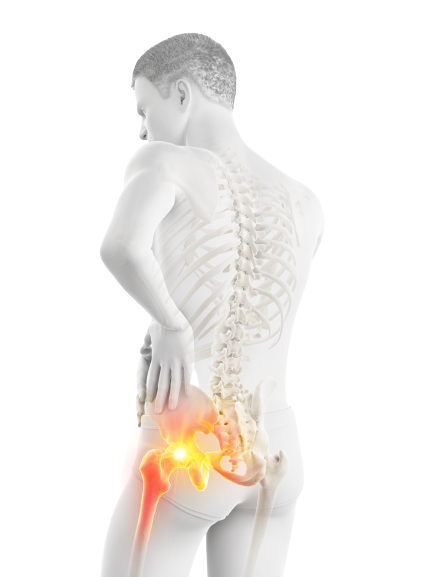Hip Pain

Hip Pain
Overview
Pain in the hip is actually very common. According to the Centers for Disease Control and Prevention, 7.1% of all patients with chronic pain say it is in their hip. Hip pain affects both children and adults and can have a variety of different causes. Pain in the hip can affect you when you: walk up or down stairs, sit or stand and exercise. The body is a machine that needs to be well looked after but life happens and accidents can happen and the body can develop pain.
Causes
The cause of your hip pain will affect when and where you feel the soreness. Anything that causes systemic inflammation in the body may also affect the hip joint. Conditions that cause hip pain may include:
- arthritis of the hip which can be caused by osteoarthritis
- lower back problems
- a fracture of the neck (top) of the femur (thigh bone)
- a strained muscle
- an inflamed tendon or other inflammatory conditions
- an infection
- pinched nerves
- sciatica pain
- bone cancer
Conditions Treated
Many people attempt to find pain relief at home with treatments such as heat or ice compresses, massage, acupuncture, gentle exercises, stretches, yoga and more for their hip pain but it is best to see your doctor to treat it safely and properly. Doctors that specialize in pain management will be able to determine what the cause of pain is and the source of it. The treatment of your hip pain depends upon the diagnosis and any underlying illness that may be taking place. Non-surgical treatments should always be considered first when treating hip pain but depending on the severity your doctor may suggest you consult an orthopaedic surgeon if surgery or other specialist treatments are needed but its best to determine the best options to guarantee the most effective course of treatment for you.
Your treatment might include:
- steroid injections
- acupuncture
- crutches, cane, walker
- anti-inflammatory, over the counter pain killing medications or creams
- antibiotics
- physiotherapy or occupational therapy
- advice about weight loss and exercise
- stretching, strengthening exercises, yoga or resistance training
- water exercises including swimming
Diagnoses
People often decide to seek help after they experience an injury based upon their ability to stand, bear weight, and walk without pain. A doctor or physiotherapist can find what is causing the pain in your hip. They may talk to you and examine you, checking how you stand, how you walk and what movements cause pain. The goal is for the doctor to understand the consistency, duration, and source of the pain in relationship to the patients daily activities. Your doctor may suggest blood tests or X-rays to assist them in determining the root cause.
The procedure / What to expect
There are different procedures that can be used to treat the patients hip pain issue. A few are: An ultrasound-guided cortisone injection which is made directly into the hip joint. That can provide relief. Another are psoas injections, which are performed under an ultrasound. These are often prescribed when the diagnosis is thought to be a symptomatic psoas tendon, which runs outside of the hip joint. Another treatment is a trochanteric bursal injection which is prescribed for patients who present clinically with bursitis on the outside of their hip, and for whom physical therapy has not provided relief. Viscosupplementation involves injecting a preparation of hyaluronic acid into the arthritic hip joint, multiple times over several weeks which can result in pain relief. Intra-articular corticosteroids injections are injected directly into the joint so they can provide anti-inflammatory effects which can ease joint pain significantly. Lastly there is extracorporeal shock wave therapy (ESWT) which offers promise for long-term relief of hip pain caused by tendinitis.
In more severe cases if it is determined there has been a fracture, hip fractures commonly will require surgery to fix it. The type of surgery depends upon the location of the fracture within the hip joint. Hip replacement is perhaps the most common joint replacement surgery. Hip resurfacing is an alternative to hip replacement. Hip arthroscopy has become more widely available to evaluate and treat hip joint damage, including labrum and cartilage tears, loose bodies within the joint, and early arthritis. Progressive arthritis can significantly affects the patient’s ability to do daily activities, and therefore getting early treatment is highly recommended.
Benefits
Living with pain is not a pleasant experience and you do not have to. With the right doctors and proper care you will be back to being able to enjoy taking walks, bike riding, exercising, practicing yoga, enjoying time with the family and friends by living life to its fullest.
How many treatments do I need
The treatment process that is right for you and amount of treatments will be determined by your pain specialist doctor.
What Follow Up is needed after treatment
The goal of hip pain therapy is to treat the underlying cause and return the patient to full function. Follow-up care will depend upon the injury or illness or injury, likewise the particular medical treatment or in the worse case scenario surgery that may be needed.
When will I feel better
This will depend on what process you and your doctor felt was best for your treatment. For the best recovery results, follow your doctor’s recommendations regarding physical therapy, exercise, diet and rest. Your doctor will provide you with a list of hip exercises focused on strength and mobility to help your continued care and healing but with the right doctor you will be on the path to feeling better as quickly as possible.
How can hip pain be prevented?
Hip pain can be minimized and mostly prevented if one lives a healthy lifestyle. This means maintaining a normal body mass index (BMI) by eating a healthy and well balanced diet, avoiding obesity, keeping your bones strong with exercising and stretching to help preserve your healthy back and normal range of motion of the hip and avoid osteoarthritis of the hips. Taking supplements for vitamin D and calcium or eating foods that have these in them such as will help ensure your bones stay strong throughout your life.
Request an appointment
We are experts in minimally invasive procedures with zero downtime, allowing you to resume regular activities the same day. Leave us your information, and we will reach out to help you verify your insurance coverage, and schedule an appointment with one of our vein specialists. We are a non-participating provider with BCBS, empire, Aetna, GHI, Cigna, United Healthcare, Oxford, BCBS Horizon, Magnacare and we will work directly with your insurance company to help you get treated with no surprise bills.
